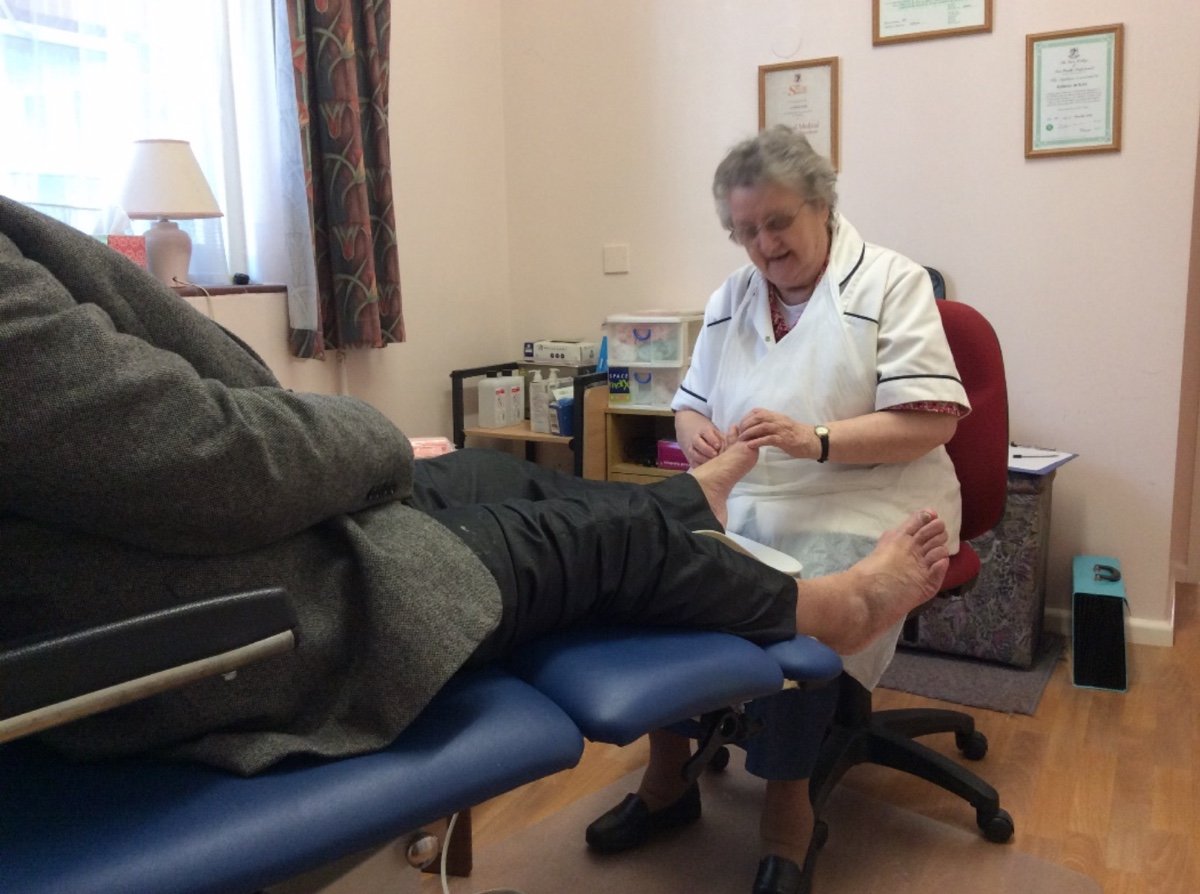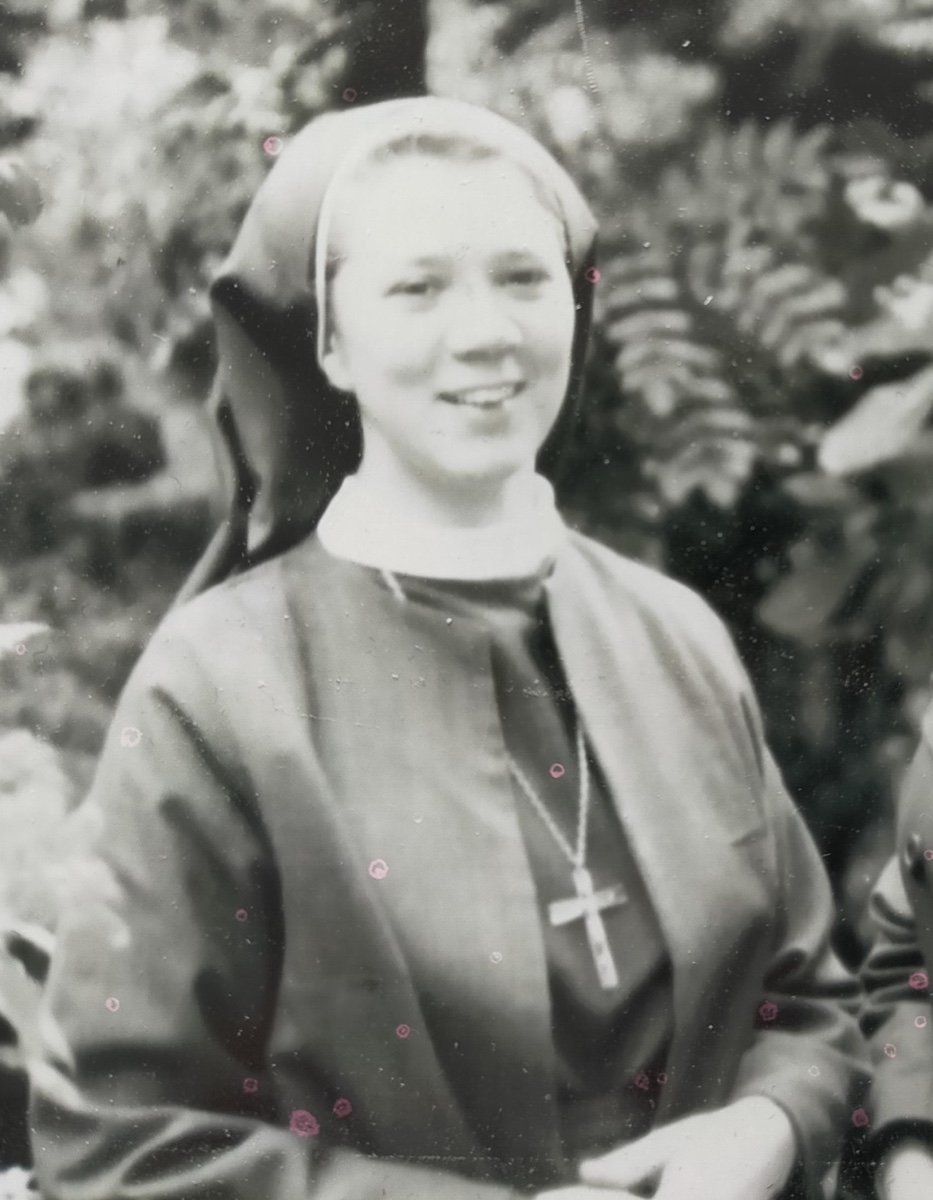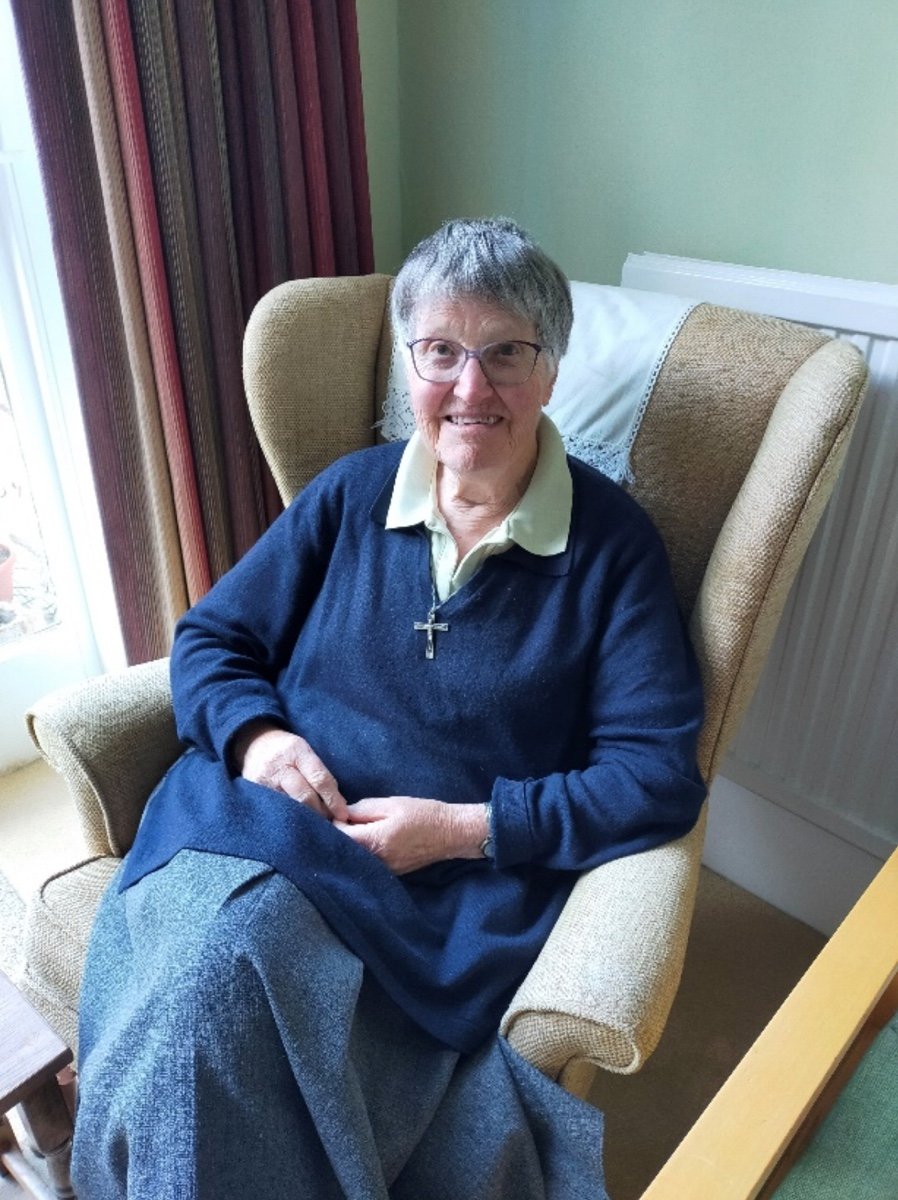Our World
While traditionally Ursulines have been associated with education we have also been fully immersed in responding to the needs of the times as we were encouraged to do by St Angela.
When Sisters retired from school or other ministries, they generously become involved in a number of social justice projects and ecumenism. They now work alongside people from a variety of faith traditions and cultures; such encounters enrich our lives. Here we give a flavour of some of our activities.
Youth Ministry
In autumn 2010 The Ursulines launched Ursuline Links a charity to give young people opportunities to give service at home and abroad. Projects such as Day Camps, helping in Care Homes, working in food banks are well supported and valued by the young people. Ursulines are involved in some of these projects. We make an annual financial contribution towards the staff salaries. More information can be found on the website: ursulinelinks.org
Foot Ministry
What on earth does one do when retiring after 41 years of teaching? This was my dilemma. I knew that I would have to do something that would keep me active, there was no way I could vegetate! After much prayer and deliberation, I felt that Foot Care was a possible opening, knowing the relief it would bring people. I investigated various possibilities and felt that full Chiropody training was too much at my age as that included surgery. I discovered that there was a course for Foot Health Professionals, which involved basic foot health care i.e., cutting nails, removing corn and calluses and general skin care. This sounded ideal, and what was even better was that the course was ‘online’. You might ask how that is possible? All the medical study was done ‘online’ with an examination at the end of each section. Then, when the College was satisfied that you had reached the required standard, they would call you for a two- week residential, practical course where you learnt how to use the various instruments and meet all the various foot problems one is likely to encounter.
For me this has been a wonderful journey. Most of my patients are elderly and to see the relief when they have completed a visit is such a joy. Some have cried when they have found that they can walk without pain. Some of my patients come to the clinic in the convent, others I visit in their homes.
Once a month I visit two Homeless Care Centres and this is my favourite encounter as the men and women I help are always so grateful and greet me like a friend. You can imagine the state of their feet!
I thank the Lord that He showed me this opening.
Citizens UK
Sr. Una McCreesh has long been involved with Citizens UK a people-powered alliance of diverse local communities working together for the common good.
Their mission: Develop local leaders. Through the method of community organising, we enable communities and local leaders to develop their voice and come together with the power and strategy to make real change.
Strengthen local organisations. Our member communities are deeply rooted in their local areas. These schools, universities, churches, mosques, synagogues, parent groups, health trusts, charities and unions, are important civic institutions which connect every day to the lives of hundreds of thousands of people.
Make change. This work leads to hundreds of neighbourhood improvements - from zebra crossings outside primary schools to reopening renovated public toilets in cemeteries.
Their work has led to some of the biggest campaign impacts in the UK, such as the Living Wage with its £1.8 billion of wages won for low-paid workers, or successful campaigns to persuade the Government to stop exploitative lending by capping the cost of credit; or introducing a law to prevent the detention of children for immigration purposes.
Sr Una writes about her involvement with the living wage:
The Living Wage was born from a simple idea – that all working families need, and deserve, a wage that covers the cost of living and meets everyday needs. Twenty years ago, here in East London, many workers found this was not the case.
The movement began at a meeting in East London, when the grassroots organisation Citizens UK brought together churches, mosques, schools and other local institutions to talk about the issues affecting their communities. One issue came up again and again – low pay. At the time the government’s minimum wage was just £3.70 an hour. Cleaners working for some of the richest financial institutions in the world were struggling to keep their heads above water, often working two or more jobs and unable to spend time with their children and partners.
Working with community organisers they decided to act, and from that meeting a powerful movement of faith leaders, trade unions and community organisations came together to call on major employers in the capital to pay their staff a London Living Wage. The campaign also called on employers to pay their outsourced cleaners, caterers and security guards a wage that met their everyday needs. Supporters held rallies and charity music gigs up and down the country. A march down the Mile End road called for all staff working in East London hospitals to be paid a Living Wage. As a result, these hospitals were among the first employers to join our movement, followed by local schools and big City firms.
The campaign spread, and at a major public assembly in 2004, Citizens UK persuaded the Mayor of London to help champion the Living Wage across the capital. Soon, low paid workers and community leaders were negotiating to make sure big projects like the Olympics paid the London Living Wage.
In 2011 the movement went national. We launched the first UK Living Wage rate and set up a Living Wage Foundation to recognise and celebrate the businesses that choose to go further than the government minimum. Today, (September 2022) the Living Wage stands at £11.95 in London and £10.90 in the rest of the UK. The campaign has provided over 250,000 people and their families with a wage that provides security and stability, with over £1.3bn in additional wages going to workers because of the campaign. That includes essential workers like cleaners, caterers and security staff.
In the last two years over 1,300 new employers committed to pay a real Living Wage. Many have been persuaded that it is not only the right thing to do, but that it makes good business sense, with healthier and more productive workers that are less likely to be absent or leave for another job. These employers join over 7,000 Living Wage accredited employers, including major household names like Aviva, Nationwide, Tate and Lyle Sugars, Burberry, Brewdog, and thousands of small businesses.
This movement wouldn’t have been possible without the adoption and continued support from those early accrediting employers. More importantly, it couldn’t have happened without the determination of those workers in East London (and throughout the UK), and the dedication of community leaders and organisers. The fact it has continued to grow over the past year shows that it is more important than ever.
The Ursuline Sisters are real living wage employers.
Prison Ministry
Sr Anastasia Nolan writes:
I always like to boast about having been in prison for 20 years! I was part of the chaplaincy team at Styal women's prison near Wythenshawe, Cheshire. I would go to the prison Monday, Wednesday, Friday and Saturday to speak to the women about their faith and run groups in the chapel. The prison had women of many different faiths- Catholic, Anglican, Muslim, Sikhs etc. It didn't matter to me where the women came from, what religion they were, they were all cared for and their religion honoured.
There were no cells, there were houses with about 15 women in each house. They had their own rooms apart from on rare occasions when two women had to share. There was a centre for the sick and a mother and baby unit.
The women had to be up in the morning, strip their beds, have breakfast and go to work. Everyone had to work. They grew all their own vegetables and there was a place to grow flowers. People who worked there were wonderful. There was an art teacher, gardeners who showed them how to plant etc, a needlework room where they would make curtains and a laundry. Whatever they were good at, they were encouraged to do it.
Some women arrived at the prison pregnant. They would go to Wythenshawe hospital to have their babies and then they were nursed at the prison.
We had a beautiful chapel and each religion would be given a day to use it. When the women came up to the chapel, we would have scripture readings, the rosary and on a Friday, a “play and pray” for the mothers and babies. There was more play than pray but I didn't mind! Mass was celebrated on a Saturday morning.
I never felt threatened by the women. Of course, there were disagreements among them, but I would go along and say “Oh girls what's this disturbance about? You are keeping me away from my prayers!” It was always ok if you kept things light-hearted with them.
A funny story was when I was getting on the bus going into Manchester and I heard someone shout “Sr Anastasia! We were in prison together!” and all the heads on the bus turned to look at me and people were moving their bags and shuffling away from me.
I look back at those years fondly. It was a wonderful time for me, I loved it.
Receptive Ecumenism
‘Receptive Ecumenism is both a way of thinking and a process that enables unity to be built by receiving gifts from others. It challenges us to not think of what others might benefit from receiving from us, but instead invites us to recognise our needs and to put ourselves in the place of being a recipient.’
Receptive ecumenism is essentially very simple. Instead of asking what other Church traditions need to learn from us, we ask what our tradition needs to learn from them – what we can receive which is of God. If each of our church traditions were to ask this question and act upon it, the hope is that we would draw closer together as family in Christ, while also deepening our own respective identities. Receptive ecumenism therefore has the potential to transform how we listen and relate as churches – learning from each other and recognising that we all have gifts to share.
Sr. Beatrice Garnett writes:
For the last few years, I have been a member of Catholic Southwark Archdiocese Christian Unity Commission. My interest began in Canterbury where an initiative from the cathedral to twin and share initiatives and exchanges with the French Benedictine abbey at Bec had been under way for a few years with friendships and understandings developing beyond the hopes first envisaged. Within the Commission meetings at the same time, we also realised the importance of following initiatives being publicised from Durham University theologians from early this century where Receptive Ecumenism was initiating a changed focus within the most fortunate to have a foundress, Catholic church. This moved away from criticism of ‘other’ Christian traditions, producing the inevitable you-come-in-ism, and towards questioning one’s own tradition in the light of the ‘other’.
Receptive Ecumenism must therefore involve closer knowledge, understanding, receptivity and friendship with other traditions and our Southwark commission therefore found ourselves involved in a most interesting and informative series of visits to Russian and Greek Orthodox, Methodists, Quakers and Anglo-Catholics places of worship. Due to the pandemic and other restrictions our meetings and outreach have been paused and we are waiting the appointment of a new Chairperson and hoping that in some way Christian unity can reappear in a new, and humbler, synodal church. To me, it seems that now is a time to emerge out of the ‘ecumenical winter’ and into some concrete and realistic reception of present-day spiritual needs and opportunities.
Sr. Vianney Connolly - Involvement in the life of St Antony’s parish
The Community of the Brothers of St John serve us parishioners at Forest Gate east London most generously! Going to church I find really enriching.
Rather than speaking about the sacramental life of our parish today though, I’ll focus on my once- a -week enjoyment of coffee/tea after 10am Mass, and my fortnightly sharing in a parish Cell meeting.
Coffee after mass on Tuesdays and Thursdays can be a hum of chatter and enjoyment of whatever food is on offer on the long table in front of us, or quite hilarious if a birthday celebration is underway! One or two of the Brothers usually slip in and relax until 11am. Those who are lonely –both old and not so old- find welcome company.
Even if I tend to miss a lot of what is said – poor hearing, and a wonderful variety of accents- it’s still a joy to be part of such a loving community.
Cell Group Meetings. For nearly 4 years our St John Cell Group has met at 7pm every other Monday. We’re a steady group of eight now; Paul is our Leader, and we’re 7 women.
The whole parish was invited to join a Cell- to foster a closer relationship with one another and grow together in our faith. The over-riding purpose is to fit us to evangelise, to share our faith with confidence and joy - like apple trees, bearing much fruit.
Fr John Jesus Moloney, our Parish Priest, provides input: a short audio or video, followed by questions. We’re expected to mull this over prayerfully before the meeting. At first we met in Paul and Myrna’s house and shared light refreshments and chat before the meeting began. Covid however demanded changes. And now fortnightly Zoom Meetings are preferred.
Because we feel at home with one another there is great simplicity and honesty in our sharing. We’re searching and growing together. I come away often heartened and humbled by glimpsing the steadfastness and beauty of others’ faith.
Sr. Jenny Glencross - Parish ministry
Ursulines in England have traditionally been associated with Catholic education in schools. Parish ministry is another form of faith education which extends into the parish and family and involves numerous aspects of people’s lives. By its nature parish ministry is freely structured so the role is multifaceted, though it operates within certain boundaries.
Parish ministry touches many aspects of the mission of the parish. These can be grouped in three main areas:
Catechesis: which includes faith-formation and teaching.
Liturgy and Prayer: Many activities fall under this wide umbrella: the Liturgy of the Word for children, encouraging adults and children to join the church choir, training of readers at Mass, organising various prayer workshops, faith sharing meetings and scripture study groups.
Building up the Parish Community: An important aspect of parish ministry is encouragement and participation in parish initiatives, e.g. concerts, social and fund raising events, food bank collections, assistance at night shelters and responding to the many needs within the local community.
My present parish is Holy Trinity Brook Green W6. Over my many years in this parish I have been responsible for a variety of activities including: prayer & faith-sharing groups, Children’s Liturgy, Children Readers at Mass, Preparation for First Holy Communion & the Sacrament of Confirmation and helping adults explore the Catholic Church Faith to become members of the Church through the Rite of Initiation of Adults (RCIA) All these have been an enriching and sometimes challenging experience allowing me the rare privilege of accompanying people in their faith. Being present in the parish is an opportunity to offer a listening ear to those who suffer bereavement or are faced with other problems.
There is always something going on in the parish and needing a helping hand and general encouragement, be it a social or fund -raising initiative, outreach to those in need or catching up with friends and co-workers for a chat.
Parish life is full of surprises: one day sometimes someone comes asking for prayer on the doorstep the next day there will be a whole range of inquiries turn up.
“Never cease to cultivate the vine. After that leave the rest to God to work His wonders at the time He finds best.”








